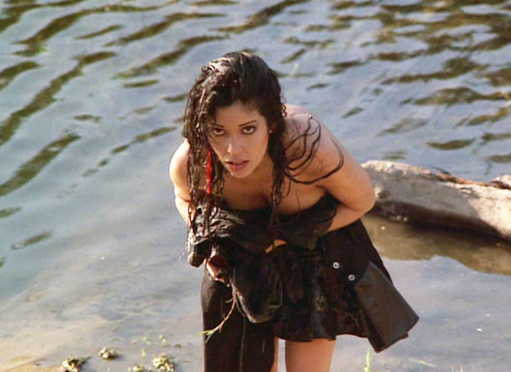As the natural process of deification in the wake of an icon’s death occurs, it’s inevitable that many tend to overlook certain glaring flaws in that person’s canon of work. In Prince’s case, his 1984 filmic and musical masterpiece, Purple Rain, has only been further ennobled post-mortem. But a re-examination of the opus quickly reveals just how trapped in the 80s it really is.
Largely biographical in nature, the film is set against the backdrop of Minneapolis’ (supposedly) then vibrant music scene on First Avenue. Starting from Morris Day’s (played by himself) brush-off of one of the many women he has decided to use up and throw away–as in literally requesting to have her tossed into a dumpster by one of his henchmen–Purple Rain establishes a tone that puts females as secondary playthings not just in the music industry, but in life.
And then, of course, there is the overall treatment of the film’s so-called heroine, Apollonia (Apollonia Kotero), as she attempts to carve out some semblance of fame and respect for her musicianship (though the outfits she chooses to don probably aren’t ideal for that). Desperate to secure a place on stage at the club where The Kid and Morris perform, Apollonia first allows Morris to attempt wooing her with a bottle of champagne as he insists, “I’m gonna make you love me.”
When she finds herself undeniably disgusted by Morris (and his music–everyone knows The Revolution has more grit), she turns to The Kid, who also happens to be more sexually appealing. As she tries to get close to him, The Kid takes her on a motorcycle ride to the lake, where he says that, if she wants his help, she’ll have to “purify [herself] in Lake Minnetonka.” Conceding to his wishes, she disrobes and wades into the lake. The Kid then informs her, “That ain’t Lake Minnetonka.” After he dangles her a bit more by preventing her from getting on his motorcycle, he says–in that double entendre way of his–“Don’t get my seat all wet,” as though being treated like shit is so arousing to women.
This is just the beginning of Apollonia’s appraisal as, for all intents and purposes, a dog. Then again, when considering The Kid’s home life, it’s no wonder he has difficulty in the realm of relationship comprehension. His father, Francis (Clarence Williams III), is constantly beating on his mother (Olga Karlatos) and urging her to “keep this place clean,” among his chief demands/alleged reasons for being angry. Though The Kid calls his home a “freak show” to Apollonia, said freak show seems to be ingrained within the veins of his blood. Case in point, after Apollonia gives him the very distinct and expensive guitar he was looking at in the window one day, he smacks her for telling him that she plans to team up with Morris to form a group, Apollonia Six.
The Kid’s unfortunate conduct when it comes to women doesn’t just extend to the people he’s having sex with, but also those he works with in his band. For instance, his fellow The Revolution members, Jill (Jill Jones) and Dez (Dez Dickerson), have been begging him to listen to a song they wrote–one that ultimately becomes “Purple Rain,” only to have The Kid brush off the idea of giving it a chance every time. It is only when creative and emotional desperation strikes that he at last decides to listen to their contribution.
Though writer-director Albert Magnoli (who would always be known primarily for this film and being Prince’s manager) is largely responsible for the pervasive female bigotry–no doubt his Italian descent probably has something to do with this–of Purple Rain, surely Prince had a strong say in the ultimate end product.
Bearing in mind that, yes, Prince was a genius and, yes, the 80s were still a particularly retro era with regard to the perception of women, Purple Rain nonetheless offers so many rampant scenes of chauvinism that it’s hard to completely immortalize it the way so many would like to at this moment in time. Then again, Mr. Yunioshi hasn’t stopped Breakfast at Tiffany’s from remaining a classic. One supposes it’s all a matter of the stomach you’ve got to bear witness to the narrow-mindedness of the past.





















